Nine of the Most Secure Email Providers
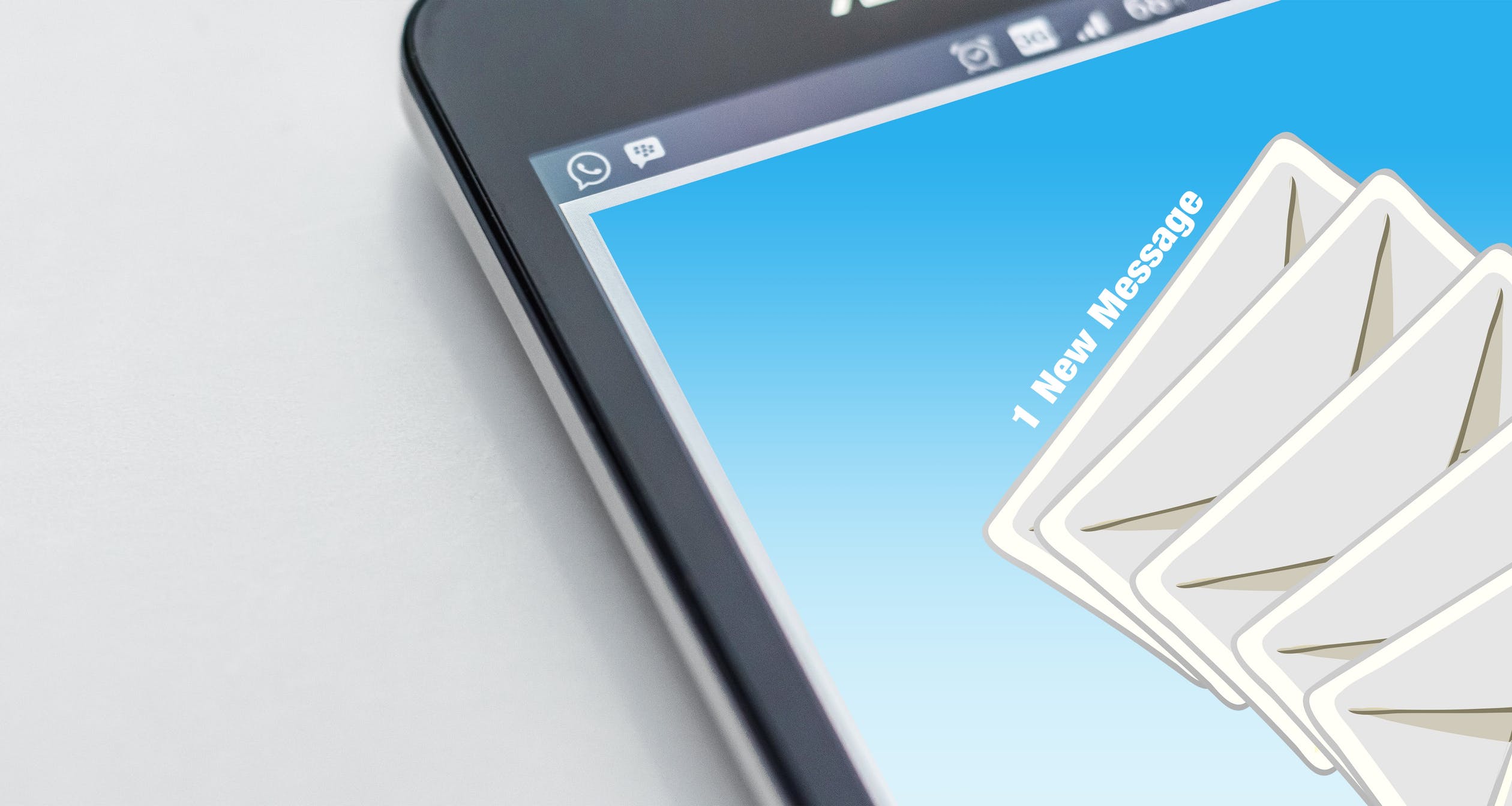
You might not think a lot about the security level of your email provider. Most users don’t, typically using the same email address first set up fifteen years ago, content with the free email account supplied by their internet service provider or the free Yahoo! or Gmail account they received in college. To a lot of people, the difference between two levels of security in your email might seem innocuous enough; after all, you have nothing to hide, no illegal activities or dangerous emails to contend with. But that doesn’t mean you should leave your email completely unprotected. The United States Postal Service doesn’t open and read your mail or check your packages prior to delivering them—or at least, they shouldn’t—so why should businesses and government officials be allowed to do the same with your email?
Email providers like Gmail and Yahoo! Mail aren’t completely unprotected, but they also aren’t the most secure email providers currently available on the market. For that, you’ll want to turn to some lesser-known email providers that focus on security, end-to-end encryption, and providing you with peace of mind. We’ve gathered a list of the nine best secured and encrypted email providers that will protect your privacy as much as possible, often for free or at a low price for data. These services don’t collect or sell your data, don’t scan your emails for keywords in order to sell directed advertisements, and don’t allow any government agencies to access server data, helping to keep your data and privacy protected as much as possible. Whether you’re trying to send an anonymous email message, or you’re attaching sensitive information like tax documents or contracts between two parties, having a secure email provider is a must.
Most of these providers offer some mixture of free and paid plans, but to unlock the majority of their features, you’ll have to lay down some cash to get the full experience. Unfortunately, free email services like those offered through Gmail and Yahoo! Mail often make you the product, through advertising and the selling of your personal data. It’s why the best way to keep yourself secured is to steer away from these free tiers of email providers and to pay a few bucks each month to keep yourself safe and secured online. These are nine of the most secure email providers on the market today.
Our Recommendation
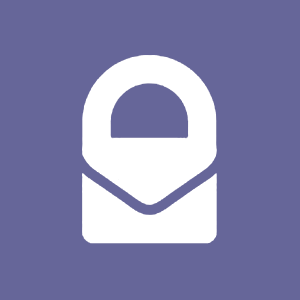
ProtonMail
What makes ProtonMail our top pick isn’t just the security the service provides to its users, but the ability to quickly set up the service and ensure that it stays safe from prying eyes. ProtonMail is based out of a security center in Switzerland, developed by scientists from CERN and MIT. The service launched in 2013 to glowing reviews, not only for its encryption and security factors but also for its ease of use as well. Setting up a ProtonMail account is as simple as setting up an email address with Gmail or Outlook, but unlike those platforms, ProtonMail has built-in security for your protection against rogue users and snooping eyes.
In terms of security and services, here’s what makes ProtonMail so powerful: the service features end-to-end encryption, something you probably hear a lot about when it comes to VPNs and private messaging apps like Signal. This means every message you send from your ProtonMail account is protected from the moment you hit send to the moment the message is opened, and it can only be viewed by the sender and the recipient. When the message is stored on ProtonMail’s private servers, only the sender, who contains the public key, and the recipient, who has the private key, can read the message. Not even ProtonMail can read the message, despite your words living on their own servers. In fact, ProtonMail promises that they mathematically cannot read your messages, because their zero-access architecture makes it impossible to decrypt the messages stored on their servers.
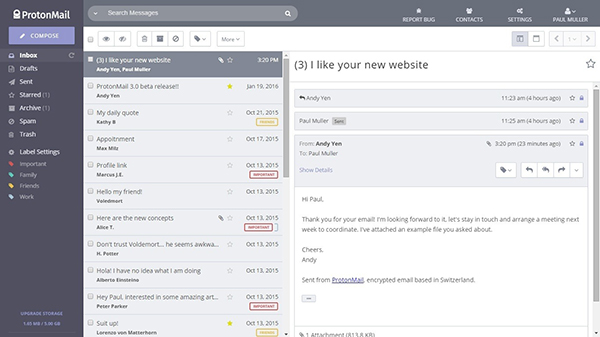
Of course, end-to-end encryption only truly functions well if you’re emailing other ProtonMail users. For this reason, ProtonMail also supports sending mail to other non-ProtonMail users while still offering the same kind of encryption you’d expect from their service. This includes mail providers like Gmail, Yahoo! Mail, Outlook, Apple Mail, and even AOL Mail. These users will receive an encrypted link in place of the email, which they can decrypt using a passphrase you’ve shared with them privately. And, of course, you can also send unencrypted emails to these users as well. As we mentioned, ProtonMail puts a strong focus on ensuring their service is easy for anyone to use. There’s no software to install on your computer, no encryption keys that you have to keep track of, and no difficult setup process. Plus, ProtonMail offers apps for both Android and iOS, and both are well-received by users.
ProtonMail has a free tier for users to sign up and use, which allows for a single user to sign up and use the service online. This supplies you with 500 megabytes of online storage, a single email address, up to 150 messages sent per day, limited customer support, and up to three labels or folders. Most users will want to spring for the Plus plan, which grants a much-more flexible user experience. For $5 per month or $48 per year, the Plus subscription grants you plenty of extra features, including the ability to send up to 1000 messages per day, store up to 5GB of cloud-based data, keep 200 folders or labels, experience normal support from ProtonMail, and use email filters and autoresponders.
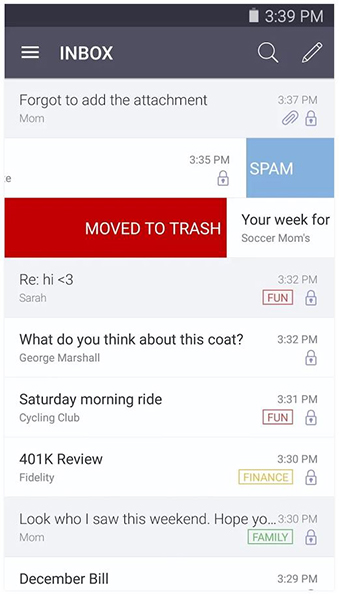
Businesses, meanwhile, will want to look into the Professional plan, which offers up to 50 users the ability to store 5GB of data per user, send unlimited messages, keep unlimited folders, and features a priority support line. The top-tier plan, fittingly titled the Visionary plan, exists for those ready to pay for the best experience offered by Proton. For $30 per month or $288 per year, you’ll receive email accounts for six different users, 20GB of cloud storage, unlimited messaging, and an included ProtonVPN to keep your internet usage secure and private.
Overall, most users looking for a secure or private email address will find a lot to like in ProtonMail. It’s easy to setup, even easier to use, and features some of the best security we’ve seen in private emails. The visual design is modern and clean, with a focus on staying secure without losing out on the visual design that makes Gmail or Outlook so popular. The importance of sending encrypted messages to unencrypted services can’t be understated, and the free tier is competent enough for low-use senders to rely on. The Plus tier, meanwhile, is great for users looking to take their email to the next level, and options for professionals and teams make it a great choice for anyone looking for a quality email service that won’t share, leak, or sell your data. If you’re looking for a one-size-fits-all package for encrypted email, ProtonMail is the option for you.
Runner Up

Tutanota
Another web-based secure platform, Tutanota mail focuses on providing the best experience possible for its users, with a wide variety of security features and solutions available within the platform for use. Tutanota boasts about its open-source systems, as well as its ability to supply private users with a fully-featured platform for their email. The security systems put in place by Tutanota make it one of our top picks for secure email platforms, and the ability to cheaply supply private email for even the most frugal of consumers reading this best-of guide.
Like ProtonMail, Tutanota does its best to keep its encryption easy to use and learn, automatically encrypting your email data on your device. This means both your email and your contacts list are kept private and secured, making it easy to avoid problematic situations online. Tutanota’s email encryption works no matter you’re using their client or not, so end-to-end encryption is possible no matter the client or time. All emails and email attachments are stored right on Tutanota’s servers, making it easy to access the content you need as you need it and send it to whomever you wish, encrypted or otherwise. These servers are kept in Germany, which means all data saved on their servers is subject to German privacy laws, but all data is encrypted end-to-end and cannot be viewed by other services or users. The service utilizes a custom solution that uses 2049-bit RSA keys and employs AES-128 encryption keys for stronger security.
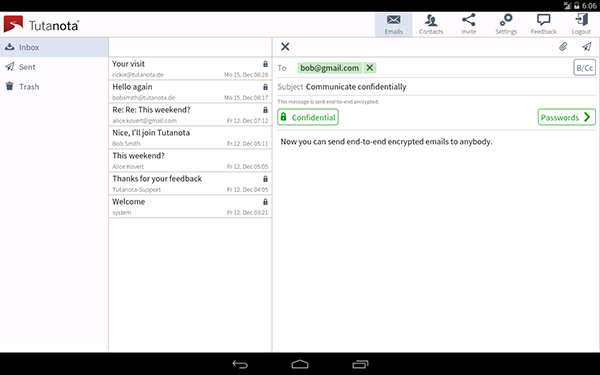
Tutanota’s biggest and best feature is its pricing. The service uses an open-source code that can be downloaded directly from the site’s Github and is licensed under GPL V3. This open-source code allows security professionals to verify the security of your emails while also maintaining your privacy, and allowing the app to be free for most personal users. Any non-business user can use Tutanota for your email for free, granting you access to a gigabyte of cloud storage for attachments, your choice of Tutanota domain, and an unlimited number of sent messages per day. If you’re interested in upgrading your account, of course, that’s an option as well.
The Plus account starts at about $1.50 per month, making it extraordinarily cheap compared to most other secure email providers on the market. This includes the option to use your own domain for your email, additional email aliases, and a premium support line. You can also expand your cloud storage and user count, though this is done on top of paying for the premium version of the app.
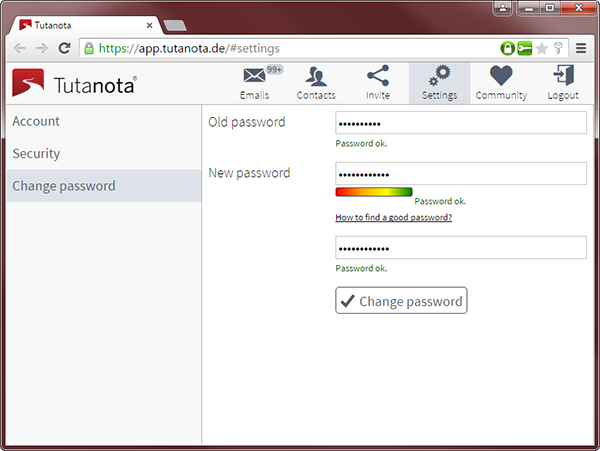
The service features apps for both iOS and Android, although we found both apps’ visual designs to be a bit behind the times when compared to other 2018-era email applications. That said, Tutanota’s development team has been touting an upcoming redesign for the mobile app that will better match the newer web client design, with a more modern feel while still keeping the features we’ve come to love from Tutanota. Whether or not the update rolls out sometime in July of this year remains to be seen, but we’re hopeful that the new application does an even better job in presenting your email on your phone.
Overall, Tutanota is a great email client. The free service can’t be beaten in terms of pricing, and since Tutanota is a web-based cloud service, there’s nothing to download or install for your computer. Much like Gmail and ProtonMail, Tutanota can be used from any device with an internet connection and a browser, regardless of the operating system. Overall, it’s a great choice for the budget-minded; its personal account option is great for anyone looking for a new email provider, and for about $17 per year, you can step up to the premium account. ProtonMail might be our top pick, but Tutanota is our best budget selection for secure email providers.
Everyone Else
Kolab Now
Also hosted within the borders of Switzerland, Kolab Now is a fully-premium secure email service that focuses primarily on business users. The platform used by Kolab is far more powerful than most other secure email services, not just in terms of its security and privacy protocols, but in how much it offers the user. The app is built like a full office suite; for example, Kolab uses their contacts system as a sort of mini-social network, making it easy to browse through your contacts and organize groups. The calendar system allows users to share calendars with collaborators and keep up to 100 independent digital calendars. It even includes a file system for browsing your cloud-saved files inside the integrated cloud service and allows you to set up a scheduling system inside the application.
All of this means that Kolab Now is built more like a suite for business users than an offering for individuals looking for a basic email address. There’s a lot offered by Kolab, essentially creating an all-in-one replacement for Microsoft Office, Google Drive, and Slack that allows businesses to focus on their work without having to deal with the limitations or the privacy concerns of less-secure services. And all that said, Kolab is no slouch when it comes to email. The service is built to host your files and emails inside a dedicated system in Switzerland, keeping your information private from foreign attackers, unknown governments, and advertisers.
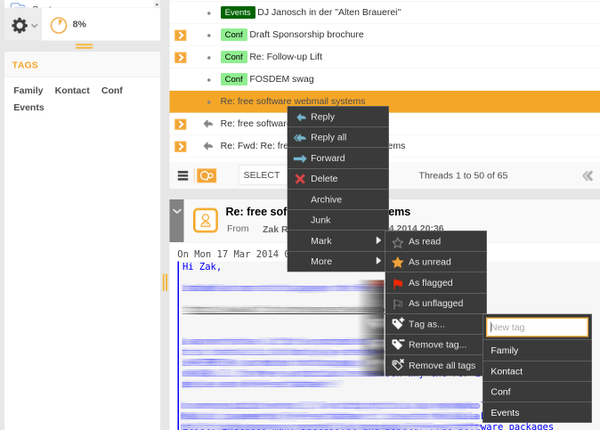
Unfortunately, Kolab doesn’t state what security protocols they implement for your saved data, and their email service doesn’t provide end-to-end encryption. That’s not the end of the world, though it does mean users looking for that sort of security will need to look elsewhere for their security, perhaps at either of our top picks on this article. But between the ability to use Thunderbird or similar email clients for fully-encrypted messages and the storage of your content in a country as secure about data as Switzerland, the sacrifice in security for the features Kolab offers might be one of the best tradeoffs in email today. Still, Kolab doesn’t come cheap. Individual accounts run users about $5 per month, with that price rising steadily through the group and hosting account options available.
Countermail
In stark contrast to Kolab, Countermail focuses entirely on your security. Though the system and accompanying website are a bit dated, the system is still regularly updated to this day, and its security protocols can’t be beaten. Countermail offers end-to-end encryption between senders and recipients, 4096-bit security keys, and uses OpenPGP and other similar security protocols to keep your email safe and your account secure. The service uses Sweden-based diskless data servers, meaning anything you send through their servers cannot be read or written. Plus, no other company is quite as open and honest about how their server system works: Countermail provides a helpful diagram of their system directly on their website, displaying proudly how secure their diskless system is for your usage.
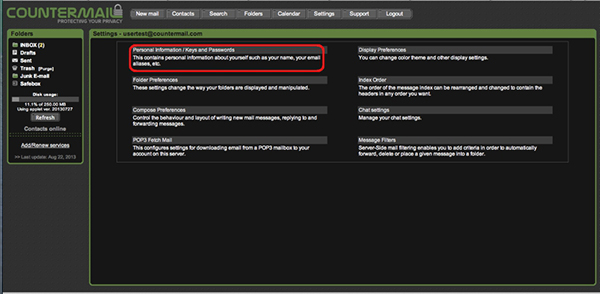
Countermail is also one of the only email services on the web to feature USB dongle keys, providing a physical security system for your cloud-based email. When used, you’ll need a physical USB key from Countermail to decrypt your email from their servers, giving only you access to the information saved inside your email account. While this is an excellent feature to provide users with, it also prevents you from accessing your information if you’ve forgotten your dongle—or if you’re trying to access information from your smartphone or another device.
The general design of Countermail is dated and lacking in style, to say the least, with a late-90s design that simply doesn’t hold up compared to most of the other interfaces on this list. However, assuming you can get over the visual imperfections, it’s one of our favorite secure email platforms on the web. Looking at pricing, Countermail doesn’t come cheap: three months of server access runs you a full $19 for only 250MB of cloud storage, and 12 months is $59 for only 500MB of storage (extra storage is available, but also costly). That said, the service does offer a week-long trial version.
Mailfence
Based on their website, Mailfence’s email system was directly inspired by Edward Snowden’s global data revelations in 2013. The general idea behind Mailfence is similar to the other platforms we’ve seen here: privacy should be a right, not a privilege, and this system stands by that. Mailfence promises no tracking, advertising, or third-party data scanning ever—something that can’t be promised by what we’ve seen from Gmail or Yahoo Mail. Like most of their competitors on this list, Mailfence keeps their sent emails encrypted on both ends, preventing everyone but the sender and the recipient from reading the message. Mailfence uses AES-256 bit security, an even-stronger standard than what our top pick Tutanota offers in their clients. And like others before it, Mailfence also hosts their servers outside of the United States, keeping their servers based in Belgium.

In terms of features, Mailfence’s closest competitor comes in the form of Kolab. Like that service, Mailfence offers several office-like applications and abilities, including private calendars, a cloud-document service, and the ability to split contacts into specific groups and users. You can access your emails from the web, any popular email platform, or your smartphone, making Mailfence a powerful modern email service. Unfortunately, dedicated apps were announced in 2017, but three years later, they have yet to roll out options for smartphones (despite assurances from the Mailfence team in our comments from 2018). Remote connections are available to sync with the client of your choice, through protocols like IMAP, POP, and ActiveSync, though it’s worth noting that you’ll have to sign up for a paid account to access these options due to maintenance and upkeep costs.
Three paid plans are available, with the basic plan including 5GB of email storage, 12GB for documents, 10,000 event calendars, and custom email domains for only $3.00. There’s also a free plan available for any personal user, which reduces your email storage to 500MB, your document storage to 500MB, and your calendars to just 1,000 events. Still, the option to use a free plan is welcomed here, and it makes Mailfence one of our favorite web apps available for private emails. While we do wish Mailfence had a full mobile app for use across multiple platforms, that doesn’t stop it from being one of our favorite secure email providers on the web today, a great service that offers an excellent web client, IMAP remote sync, and full security options for your email.
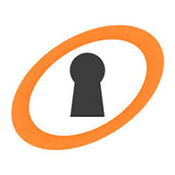
Hushmail
Hushmail is a great option for anyone looking to gain access to similar features to ProtonMail in a service that has been around for nearly twenty full years. Based out of Vancouver, Hushmail sells itself as a fully enhanced email security system for the modern web, with a focus on business offerings but the ability to use it with personal sources as well. Like ProtonMail, Hushmail pushes itself as an encrypted service, using a password system to both send and receive emails from Hushmail platforms. When you’re sending your message, your first email gives you the option to encrypt your email by checking a small box on the menu. If you’re sending an email to another Hushmail user, the message is automatically encrypted, which will grant them access to reading the email in their current web window, right within the email without any add-ons or new windows.
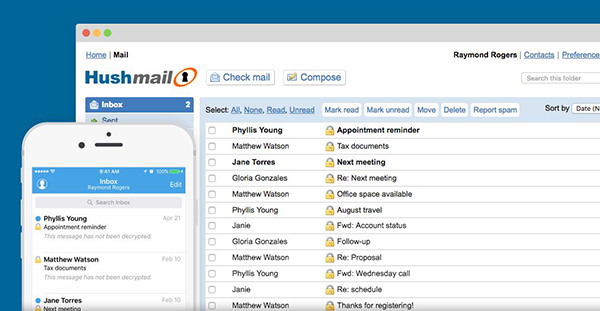
If they don’t have access to a Hushmail account, don’t worry—you can still send encrypted emails from your account to Gmail or Outlook users, but you’ll have to turn it on manually in your email. Once you’ve sent the encrypted message, non-Hushmail users will receive a prompt in their email, inviting them to a secure web page where they can view your message or documents. Viewing the documents is as easy as creating a passcode for their own Hushmail viewer account, along with the answer to an (optional) security question designed by the sender to open the message, effectively working as a password system for the emails viewable in your browser. It’s a strong system, one that works well, and the interface for Hushmail makes it easy for the recipient to figure out what they’re doing.
Hushmail’s encryption protocols use OpenPGP encryption to protect the contents of the email and SSL/TLS secure connections between computers and the Hushmail servers to access your content. The email system isn’t free, however. Personal accounts run you $49.99 per year, a semi-expensive rate considering the free offerings Hushmail is competing against. Still, at around $4 per month paid annually, it’s a decent option to jump in with. That price grants you 10GB of storage, ad-free accounts, a fully serviceable webmail client with an iPhone app (unfortunately, no Android app as of writing), and multiple email aliases. It’s not free, but it’s an affordable annual price for a solid encrypted offering.
Posteo
Posteo is a privately-owned email service that is hosted in Germany, allowing users all over the world to take advantage of their secure and private anonymous platform. Though the company doesn’t offer a free tier, the email service is entirely ad-free and has made a name for itself by aiming to offer greater security, privacy, and sustainability on the internet than their alternatives. The service is open-source and features anonymous signup, two-factor authentication when logging in, and TLS-encrypted access on their servers. Backups of your account occur each day and last for seven days before being purged from their system. All of Posteo’s hard disks are encrypted, as are their emails, data, and attachments sent through the service.
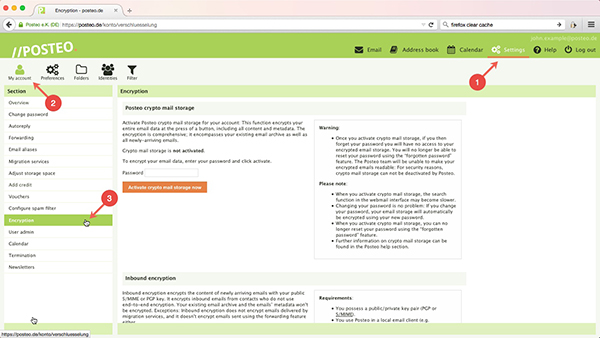
In terms of additional features, Posteo also offers a fully-secured address book, encrypted with AES bit protection, a calendar system that can be shared with other users and also supports reminders, and a focus on running a green-energy company from their headquarters in Germany, including using energy-efficient hardware and optimizing their server sizes to maximize their green output. Posteo isn’t a free service, but it is affordable, charging users $1.20 per month (payable anonymously) to access their base 2GB accounts. Additional gigabytes of storage can be purchased for about 30 cents each month per gigabyte, as can additional calendars and email aliases. Posteo isn’t the most private service on our list—the system lacks end-to-end encryption without the use of an additional browser add-on, something you can’t use at every company in America—but that doesn’t stop it from being a great choice for those looking for a secure alternative to Gmail that doesn’t scan your emails in order to serve you advertisements.
LuxSci
LuxSci is one of the few secure email providers on this list with servers based in the United States. The service is aimed mainly at business users and professionals, and focuses primarily on offering those users a full email-based productivity suite while keeping encryption a priority. All emails sent from LuxSci support end-to-end encryption, with no setup required and a plugin available for Outlook users. The service uses SMTP protocols, TLS and SSL technologies, and other security systems to keep your email safe and secure, and the system is compatible with any desktop or mobile web client. LuxSci calls their secure email system SecureLine, and it helps keep prying eyes out of your personal and private information.
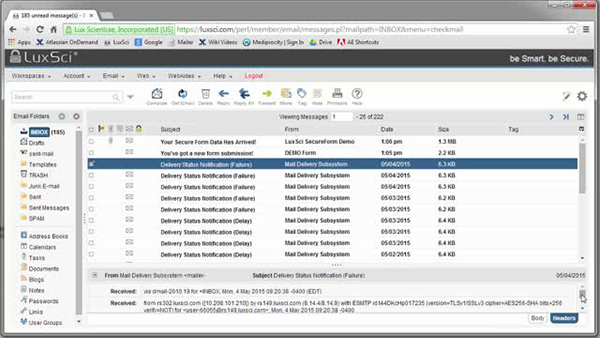
As mentioned, the system primarily is made for business users looking to migrate to a more secure form of email, and the prices display this. Monthly email hosting costs start at $10 for LuxSci, with most accounts made during business hours ready in about an hour. A LuxSci support member will even give you a thirty-minute walkthrough of your new email account over the phone, making it easy for anyone to learn how their email system works without much training or know-how. LuxSci offers several different business and premium plans on its website, ranging from the basic SecureLine email system to more complicated web hosting plans for higher-end users. Though the company isn’t a great choice for personal users, anyone looking for a business-tier email system will find plenty to love with LuxSci.
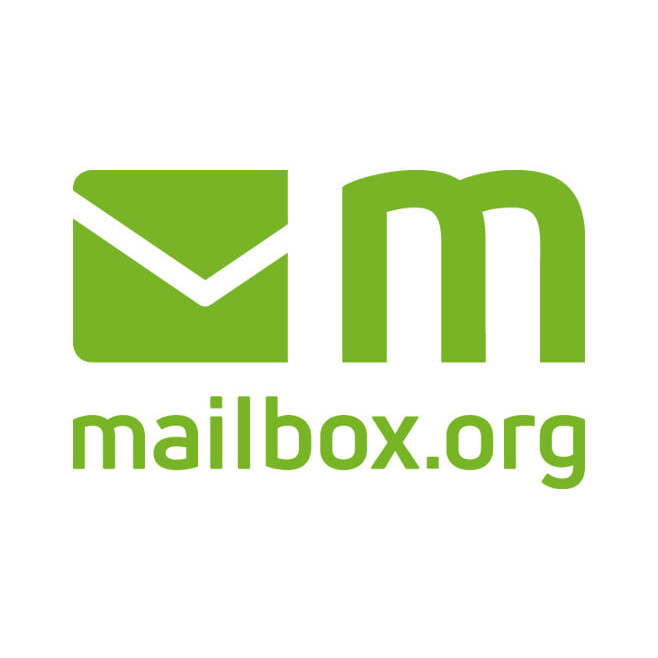
mailbox.org
mailbox.org is one of the oldest and most reliable solutions to the privacy needs of email users. The creators of the service have been creating digital security solutions since the 1980s, so you’ll know that your emails are in safe hands.
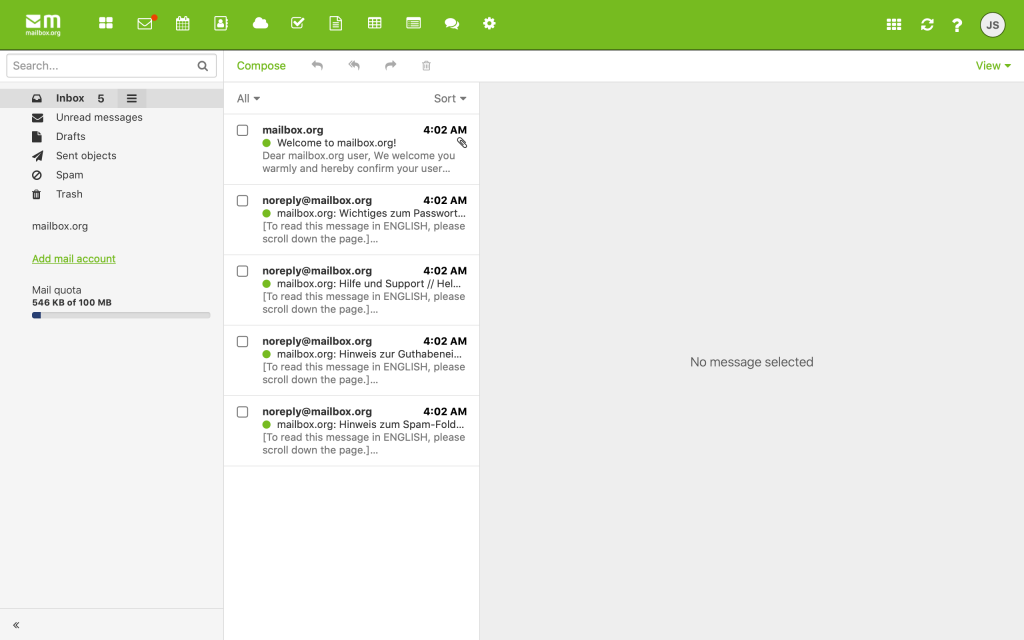
Like most secure email providers, mailbox.org encrypts your emails end-to-end. This means that the only person who can read the emails you’re sending are the people you’re sending those emails to. If your recipient is using a mailbox.org account as well, then the encryption process works as seamlessly as you’d expect. For recipients that don’t use mailbox.org, mailbox.org sends the recipient a disposable link to view this email. Through this link, the recipient can read and respond to your emails. After they send their response, the link will be discarded, leaving your information safe.
mailbox.org’s servers are in Germany, which means they’re protected by excellent security laws. This provides you with the best chance at anonymity possible. You can even create your mailbox.org account completely anonymously using Bitcoin. mailbox.org doesn’t require you to put in any personal information (though you can add as much as you like), so, by entering nothing and paying in Bitcoin, you can the service with complete, end-to-end encrypted anonymity.

















30 thoughts on “Nine of the Most Secure Email Providers”
They require a number capable of sms. For me this is not a mobile phone as I will not carry a digital leash.
WHEN there is any kind of problem they will only unlock the account for a sms message.
Lose your digital leash number?
F you. No email for you
NO zoho
They require a number capable of sms. For me this is not a mobile phone as I will not carry a digital leash.
WHEN there is any kind of problem they will only unlock the account for a sms message.
Lose your digital leash number?
F you. No email for you
NO zoho
I have reported crimes that had concern over children kidnapped by wife and Government assist situation. Wife, Megan Sharon Gray. Children, Vincent and Victor Bower. Government cause snooping and stalking, privacy act violations and constant interference through network of computer and phones. Unable to utilize legal services available to public due to Authorities involved which have provoked Human Rights and my rights as father.
Applications to take devices over by force in constant effect. ELF/VLF frequency device torture to be chemically induced and blackmailed. Constant attacking day in and day out which has attempts to cover up situation, expose children mutilated and tortured or off grid and not translated properly. Full video and audio feedback to enforce problematic choice making. Ignores legal action and pursues murder by biomagnetic frequency methods which supports mechanism controlled relay of government demands and threat to life.
False accusations have been presented to me after seeking legal custody order. Falsified protective order and hearsay police reports have been obtained through various government officials that had reported back. Personal accounts which report involvement. Prevention of local authority involvement. Altering email and legal documents;which I have many duplicate or two copy forms stating two versions. Authorities seeking to take property from my home and upholds nonlaw abiding factors to be at risk. IP log and applications involved in unlawful attempt to forbid communication have been captured. Built software, VPM built on hdd/ssd have been seen populating files and cloning of data.
I’m requesting these acts of the government to be eliminated and rights be upheld. I would appreciate it if understood aspect of local authorities are forbidden to get involved by government and not myself. Attempts have been made. If possible, please forward to appropriate individuals that may assist.
I thank you and I hope you have a great rest of your day.
I have reported crimes that had concern over children kidnapped by wife and Government assist situation. Wife, Megan Sharon Gray. Children, Vincent and Victor Bower. Government cause snooping and stalking, privacy act violations and constant interference through network of computer and phones. Unable to utilize legal services available to public due to Authorities involved which have provoked Human Rights and my rights as father.
Applications to take devices over by force in constant effect. ELF/VLF frequency device torture to be chemically induced and blackmailed. Constant attacking day in and day out which has attempts to cover up situation, expose children mutilated and tortured or off grid and not translated properly. Full video and audio feedback to enforce problematic choice making. Ignores legal action and pursues murder by biomagnetic frequency methods which supports mechanism controlled relay of government demands and threat to life.
False accusations have been presented to me after seeking legal custody order. Falsified protective order and hearsay police reports have been obtained through various government officials that had reported back. Personal accounts which report involvement. Prevention of local authority involvement. Altering email and legal documents;which I have many duplicate or two copy forms stating two versions. Authorities seeking to take property from my home and upholds nonlaw abiding factors to be at risk. IP log and applications involved in unlawful attempt to forbid communication have been captured. Built software, VPM built on hdd/ssd have been seen populating files and cloning of data.
I’m requesting these acts of the government to be eliminated and rights be upheld. I would appreciate it if understood aspect of local authorities are forbidden to get involved by government and not myself. Attempts have been made. If possible, please forward to appropriate individuals that may assist.
I thank you and I hope you have a great rest of your day.
With that your credibility evaporated.
With that your credibility evaporated.
I feel very confidant in there service.
I feel very confidant in there service.
First things first; there are a few in this report that caught my attention and I will look at them.
The general problem is that there are so many providers. That makes it sometimes difficult to use the full service of one.
Another problem that I have noticed is, that way too many user are just very lazy or not bothered to start encrypting emails (or any other information such as on SM, sms etc). A simple example is this; tell someone to install “Signal” (simple and straight forward). Alas they wont! Not only private people but also companies. From that perspective it’s of course very difficult to implement email security.
I think there is a wrong believe when folks think that “when an email server is in Switzerland, then all is fine!” Wrong! Switzerland has changed their surveillance law only 2-3 years ago. And that law is broad – I mean really broad. It’s like a sponge; squeeze it as long as you can. I am sure there is an option that also Switzerland can demand data from email providers. Only, it’s sure not as blunt as in the US with subpoenas – but still possible.
Another option I see where the Swiss could be working at is to “plant their own people” in those companies who are developing secure email services. Once they have one infiltrated there, it will be easy for them to work their way towards gaining access (how ever that would/could look like).
Just for the record here; Switzerland is famous of “cleaning the internet of critics that is addressed towards Switzerland”. They have full access to Twitter, Reedit, Facebook. The access i given by those SM companies. The deal is; Switzerland polices those places for possible crimes and in return they get the full access. That gives them the opportunity to clean anything that is deemed negative for Switzerland.
The security of a provider is only temporary. Once popularity has taken up, also Governments become more interested and start finding their way to get access to information. So the best chance for users are those services where you can use your own domain. But again, once your domain is “on the radar” – don’t fool yourself believing that a server change will also remove the problem. Once on the radar – you stay on the radar.
This here is just a simple and short writing. Conclusion is, that 99% of users are lazy and see it rather as an obstacle when having to use e2e encryption. That makes it difficult for you as a serious and willing user of e2e encryption to find anyone going your way. From that perspective, it sets the demands to providers very clearly to have e2e encryption without big interaction of the user.
Again, my personal experience over three decades have being horrendous – “if you’re not a bad guy you have nothing to fear” is deadly and only serves those who wants to know what others are chatting.
Just my 2c – take it or leave it.
Still I like to hear your view.
Thanks
First things first; there are a few in this report that caught my attention and I will look at them.
The general problem is that there are so many providers. That makes it sometimes difficult to use the full service of one.
Another problem that I have noticed is, that way too many user are just very lazy or not bothered to start encrypting emails (or any other information such as on SM, sms etc). A simple example is this; tell someone to install “Signal” (simple and straight forward). Alas they wont! Not only private people but also companies. From that perspective it’s of course very difficult to implement email security.
I think there is a wrong believe when folks think that “when an email server is in Switzerland, then all is fine!” Wrong! Switzerland has changed their surveillance law only 2-3 years ago. And that law is broad – I mean really broad. It’s like a sponge; squeeze it as long as you can. I am sure there is an option that also Switzerland can demand data from email providers. Only, it’s sure not as blunt as in the US with subpoenas – but still possible.
Another option I see where the Swiss could be working at is to “plant their own people” in those companies who are developing secure email services. Once they have one infiltrated there, it will be easy for them to work their way towards gaining access (how ever that would/could look like).
Just for the record here; Switzerland is famous of “cleaning the internet of critics that is addressed towards Switzerland”. They have full access to Twitter, Reedit, Facebook. The access i given by those SM companies. The deal is; Switzerland polices those places for possible crimes and in return they get the full access. That gives them the opportunity to clean anything that is deemed negative for Switzerland.
The security of a provider is only temporary. Once popularity has taken up, also Governments become more interested and start finding their way to get access to information. So the best chance for users are those services where you can use your own domain. But again, once your domain is “on the radar” – don’t fool yourself believing that a server change will also remove the problem. Once on the radar – you stay on the radar.
This here is just a simple and short writing. Conclusion is, that 99% of users are lazy and see it rather as an obstacle when having to use e2e encryption. That makes it difficult for you as a serious and willing user of e2e encryption to find anyone going your way. From that perspective, it sets the demands to providers very clearly to have e2e encryption without big interaction of the user.
Again, my personal experience over three decades have being horrendous – “if you’re not a bad guy you have nothing to fear” is deadly and only serves those who wants to know what others are chatting.
Just my 2c – take it or leave it.
Still I like to hear your view.
Thanks
The haters have a filter that only allows them to see what suits them, even if the object to attack is good.
None of these services is in jurisdiction, you have invented it to obscure its validity.
Are you going to tell me how safe Gmail and Hotmail are?
Friend, please keep an open mind.
“Friend,” please quit calling people “haters”
The haters have a filter that only allows them to see what suits them, even if the object to attack is good.
None of these services is in jurisdiction, you have invented it to obscure its validity.
Are you going to tell me how safe Gmail and Hotmail are?
Friend, please keep an open mind.
“Friend,” please quit calling people “haters”
microsoft bought hotmail
now hotmail is untrustworthy
qed
at least microsoft does not slaughter the innocent in the name of population control for Molech
microsoft bought hotmail
now hotmail is untrustworthy
qed
at least microsoft does not slaughter the innocent in the name of population control for Molech
Protonmail sends snippy comments such as “Clearly, you have forgotten your password”. Really? Well, how did I get into my account?
I don’t know how its done. The hacker gets in, locks me out. They got into the app, changed the pin, took away the touch ID. Its a game to them. Protonmail support is no support at all. They are so caught up in how secure they are that they won’t listen to what is happening. They want me to leave an e-mail address in this form. I have none.
If this person can hack in and out at will, then any hacker can do it. NOT SAFE!
Has your problem been sorted out?
And what did the protonmail support have to say???
Can’t recommend Proton now, lots of spam, very expensive and deceptive practices. Use a VPN or secure email provider that can’t be trusted? No.
Protonmail sends snippy comments such as “Clearly, you have forgotten your password”. Really? Well, how did I get into my account?
I don’t know how its done. The hacker gets in, locks me out. They got into the app, changed the pin, took away the touch ID. Its a game to them. Protonmail support is no support at all. They are so caught up in how secure they are that they won’t listen to what is happening. They want me to leave an e-mail address in this form. I have none.
If this person can hack in and out at will, then any hacker can do it. NOT SAFE!
Has your problem been sorted out?
And what did the protonmail support have to say???
Can’t recommend Proton now, lots of spam, very expensive and deceptive practices. Use a VPN or secure email provider that can’t be trusted? No.
“But what really makes Gmail a better option than ProtonMail in this regard, though, is its new optional “Advanced Protection” service, an even stronger set of security features that make it extremely hard for anyone to hack into your account. “Advanced Protection” requires the use of physical tokens or security keys, which make phishing attacks virtually impossible to pull off.”
Thank you!
“But what really makes Gmail a better option than ProtonMail in this regard, though, is its new optional “Advanced Protection” service, an even stronger set of security features that make it extremely hard for anyone to hack into your account. “Advanced Protection” requires the use of physical tokens or security keys, which make phishing attacks virtually impossible to pull off.”
Thank you!